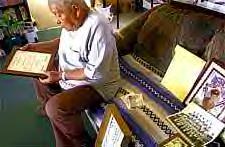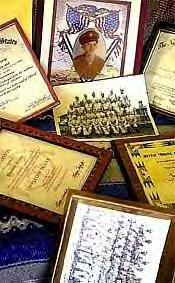|
|
Canku Ota |
|
|
(Many Paths) |
||
|
An Online Newsletter Celebrating Native America |
||
|
January 13, 2001 - Issue 27 |
||
|
|
||
|
Forgotten Heroes |
||
|
Non-Navajo Code Talkers Seek Equal Recognition |
||
|
by Mark Shaffer The Arizona Republic |
||
|
Photos by Mark Henle The Arizona Republic |
||
 POLACCA
- Franklin Shupla says it's for someone else to judge the worthiness of the time he spent more than five decades
ago using his Hopi language to radio top-secret messages for the Army. POLACCA
- Franklin Shupla says it's for someone else to judge the worthiness of the time he spent more than five decades
ago using his Hopi language to radio top-secret messages for the Army.He's a lot more bothered now about his two artificial knees, his grandchildren respecting Hopi traditions and his corn crop. But the pain is palpable when Shupla, 77, talks about President Clinton's decision last month to award congressional gold medals to the original 29 Navajo Code Talkers and silver medals to the approximately 300 Navajos who followed in the South Pacific. For other tribes who used their native languages to confound enemies in both world wars - including the Choctaw, Sioux, Chippewa and Seminole - there has been little historical mention, much less recognition. Shupla and the only other two living Hopi Code Talkers, Travis Yaiva and Floyd Dann, have been honored only on the Hopi Reservation with tribal certificates. A grass-roots campaign taking shape nationwide wants honors for all. "I honor the Navajos for the excellent job that they did," said Hopi Councilman Cliff Balenquah, a former director of the tribe's Veterans Affairs office. "But they find no shame in giving themselves honor. There are a lot of Code Talkers and their families who are equally deserving of these congressional medals." Balenquah has been lobbying the state to recognize the Hopi Code Talkers and plans to take his campaign national on the part of all Code Talkers. Like the efforts of Liz Pollard, an Anadarko, Okla., business owner, who created a Web page last year with a petition and mock congressional resolution to pressure Congress to honor all Native American Code Talkers. "It's been frustrating because there seems to be a lot of public support. But I can't get anyone in Congress interested, including the only Native American senator, Ben Nighthorse Campbell," Pollard said. That kind of talk bothers Thomas Begay, a Navajo Code Talker in the Marines during the battle for Iwo Jima. Begay said the Navajos' contributions were greater than other tribes because they created hundreds of words in special encoded vocabularies. But William Meadows, who has written a book about the Comanche Code Talkers, puts the Comanche encoding efforts on the same level as the Navajos'.  Shupla said the original 11 Hopi Code Talkers also went to extraordinary lengths to use Hopi words
and concepts to come up with terms for battle in their months of training in the southern Arizona desert, near
Dateland, in 1943. Shupla said the original 11 Hopi Code Talkers also went to extraordinary lengths to use Hopi words
and concepts to come up with terms for battle in their months of training in the southern Arizona desert, near
Dateland, in 1943.They came up with the Hopi word for eggs, nu-hu, for bombs; bah-ki, a house on water, for ships; and the different kinds of birds for planes, like pah-we-waka, ducks, for sea planes. The word for chicken hawks was used for dive bombers. The Hopi Code Talkers were assigned to the Army's 223rd Battalion and shipped to Hawaii for jungle training. They then moved on to Guadalcanal as the battle for that island was near its end. They first used the language in combat on the Marshall Islands and later at New Caledonia before shipping out to Leyte in 1944 after Gen. Douglas MacArthur honored his pledge to reconquer the Philippines from the Japanese. But it's not the Japanese troop movements and the calls for supplies and reinforcements that Shupla remembers. Instead, he remembers the jokes he and his fellow Code Talkers made about commanding officers - also a favorite pastime of the Comanche Code Talkers in Europe, said Lloyd "Van" Codynah of Lawton, Okla., whose father, Haddyn, and uncle, Charles Chibitty of Tulsa, were among the 17 Comanche Code Talkers in Europe. Chibitty, the only living Comanche Code Talker, was among the early arrivals on the beach at Normandy on D-Day and in the Battle of the Bulge. The Comanches, from Walters, Okla., befuddled the Germans so much that spies were sent to its training grounds in Fort Gordon, Ga., and to the reservation areas in Oklahoma to try to decipher the code. Two of the spies were arrested and convicted of espionage, Codynah said. "It always really bothered my dad before he died in 1988 about the lack of recognition they had received," Codynah said. "The government tried to give my uncle a Congressional Medal of Honor a few years back, but he turned it down because they wouldn't give it to the other Code Talkers, too, whom he considered his brothers." The only national recognition Chibitty has received was being a 1999 recipient of the Defense Department's Knowlton Award in recognition of his significant contributions to military intelligence efforts, Codynah said. "It's very ironic to me that the French government flew over the Comanche Code Talkers in 1989 to receive one of that country's highest awards, yet they can't even get one lousy medal from their own government," Codynah said. The French honored the Comanches because the tribe's members were the only ones who fought on French soil. Said Shupla: "If the president included all of us, it sure would make us happy. But I also think at times that maybe it should just be forgotten about. When I wake up in the middle of the night, I'm thinking about my grandchildren, not the Philippines in 1944." |
|
Read an article about the Code Talkers from various Tribes Code
Talkers |
|
|
||
|
|
||
| Canku Ota is a free Newsletter celebrating Native America, its traditions and accomplishments . We do not provide subscriber or visitor names to anyone. Some articles presented in Canku Ota may contain copyright material. We have received appropriate permissions for republishing any articles. Material appearing here is distributed without profit or monetary gain to those who have expressed an interest. This is in accordance with Title 17 U.S.C. section 107. | ||
|
Canku Ota is a copyright © 2000, 2001 of Vicki Lockard and Paul Barry. |
||
|
|
The "Canku Ota - A Newsletter Celebrating Native America" web site and its design is the |
|
|
Copyright © 1999, 2000, 2001 of Paul C. Barry. |
||
|
All Rights Reserved. |
